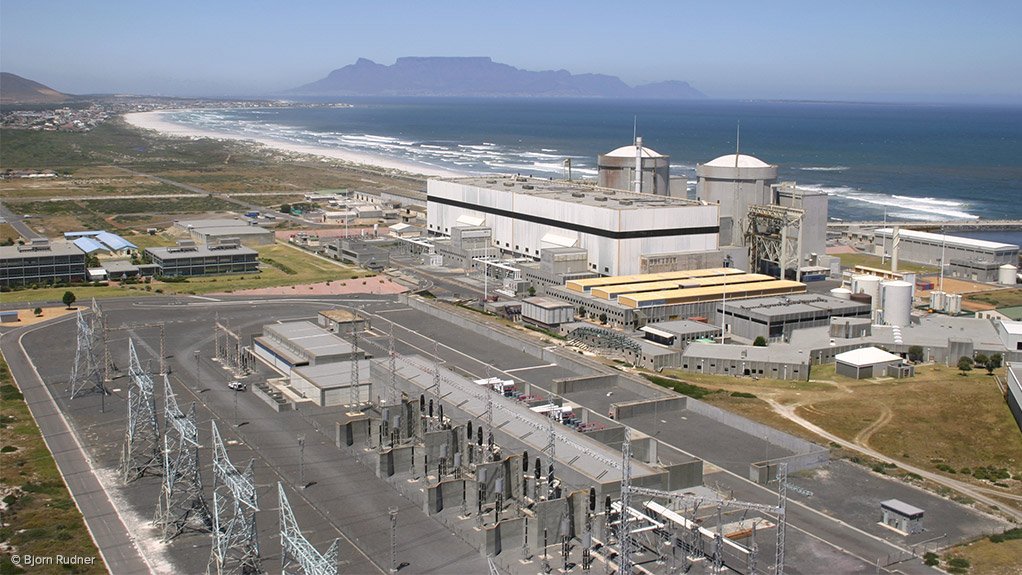Eskom has announced a delay to the return of Koeberg Unit 1 from another extended maintenance outage, but insists that the risk of loadshedding this winter has not increased as a result.
The unit was shut early in the year for the second phase of its long-term operation maintenance programme, which was a requirement of its 20-year life extension granted by the National Nuclear Regulator (NNR) for the unit last year.
The outage was meant to last 150 days, and the unit was initially scheduled to return to service in July.
However, on July 15 Eskom announced that Unit 1 was now scheduled to be back online only by the end of August, following inspections that revealed tube defects.
“During scheduled detailed eddy current inspections — a non-destructive testing method used to detect cracks, corrosion, or wear in the metal tubes of steam generators — defects were identified on four tubes among several thousand tubes inspected, across two of the newly installed generators.
“Eskom immediately carried out an advanced automated process to address the four tube defects, supported by specialised international teams working alongside local experts.
“These critical repairs have now been successfully completed to uphold the highest safety and quality standards,” Eskom said in a statement.
It also announced the conclusion of other maintenance activities, including the legally required 10-year Integrated Leak Rate Test (ILRT), where the reactor building was pressurised over 72 hours and its leak rate and structural integrity monitored.
“The ILRT confirmed the robustness and leak-tightness of Unit 1’s containment structure, further reinforcing its safety in line with international standards.”
Meanwhile, Eskom insisted that the delayed return of Unit 1 did not increase the risk of loadshedding, which has waned materially since 2023 when power cuts were an almost daily or twice daily occurrence.
In March, Eskom resorted to Stage 3 loadshedding after Koeberg Unit 2 unexpectedly tripped, having been synchronised to the grid again on December 31. This, following the unit’s own extended and delayed outage, which was also undertaken in a bid to secure a licence to operate for a further 20 years.
The NNR has not yet pronounced on the Long Term Operation of Unit 2, but is expected to do so in the coming months.
Eskom said Unit 2 remained fully operational, generating up to 946 MW, with a year-to-date energy availability factor (EAF) of 99.38% as of the end of June 2025.
MORE DIESEL BEING BURNT
To support its claim that there was no increased loadshedding risk, Eskom pointed to progress being made on other generation projects this year, including the synchronisation on March 23 of the 800 MW Kusile Unit 6, and the return, on July 6, of the 800 MW Medupi Unit 4, which had been inoperative following an explosion in August 2021.
“The revised return date for Koeberg Unit 1 will not increase the risk of loadshedding,” Eskom said, arguing that its Winter Outlook, which covers the period until 31 August 2025, remained valid.
“The outlook shows that loadshedding will not be required if unplanned outages remain below 13 000 MW.
“Even if outages rise to 15 000 MW, loadshedding would be limited to a maximum of 21 days over the 153-day winter period, capped at Stage 2.
“Since 15 May 2025, no loadshedding has been implemented, and only 26 hours of loadshedding have been recorded for the financial year to date (1 April to 10 July 2025).
“The national power system remains stable, with a month-to-date EAF of 62%,” Eskom said.
In its most recent weekly update, however, Eskom acknowledged that its year-to-date EAF of 58.83% was lower than the 61.74% recorded during the same period last year, which it attributed to a 2.9% year-on-year increase in unplanned maintenance.
“Year-to-date, Eskom spent R5.26-billion on fuel for the open-cycle gas turbine (OCGT) fleet, generating 892.42 GWh.
“This is higher than the 485.39 GWh generated [by the OCGTs] during the same period last year,” the update stated.
EMAIL THIS ARTICLE SAVE THIS ARTICLE ARTICLE ENQUIRY FEEDBACK
To subscribe email subscriptions@creamermedia.co.za or click here
To advertise email advertising@creamermedia.co.za or click here











